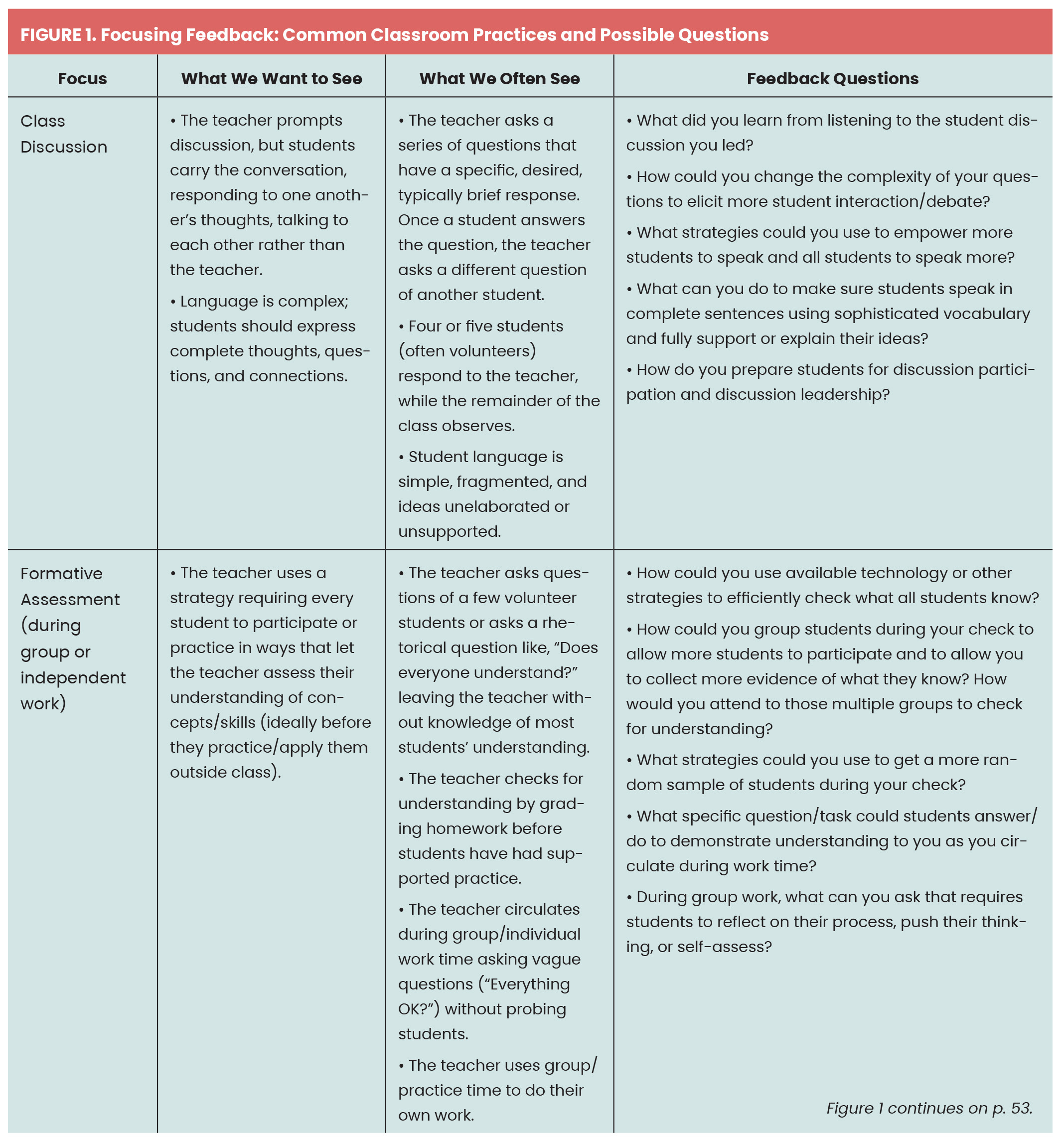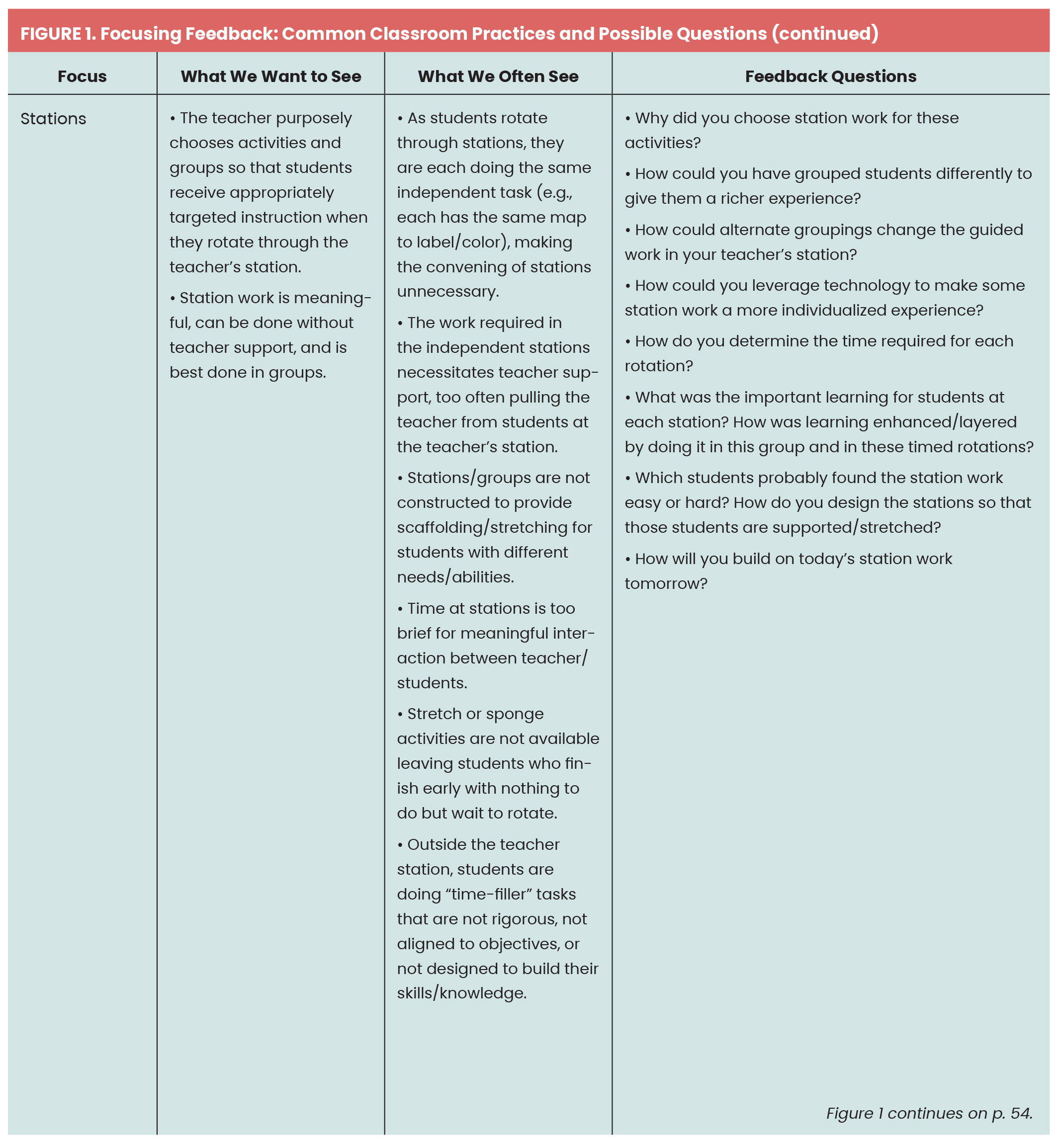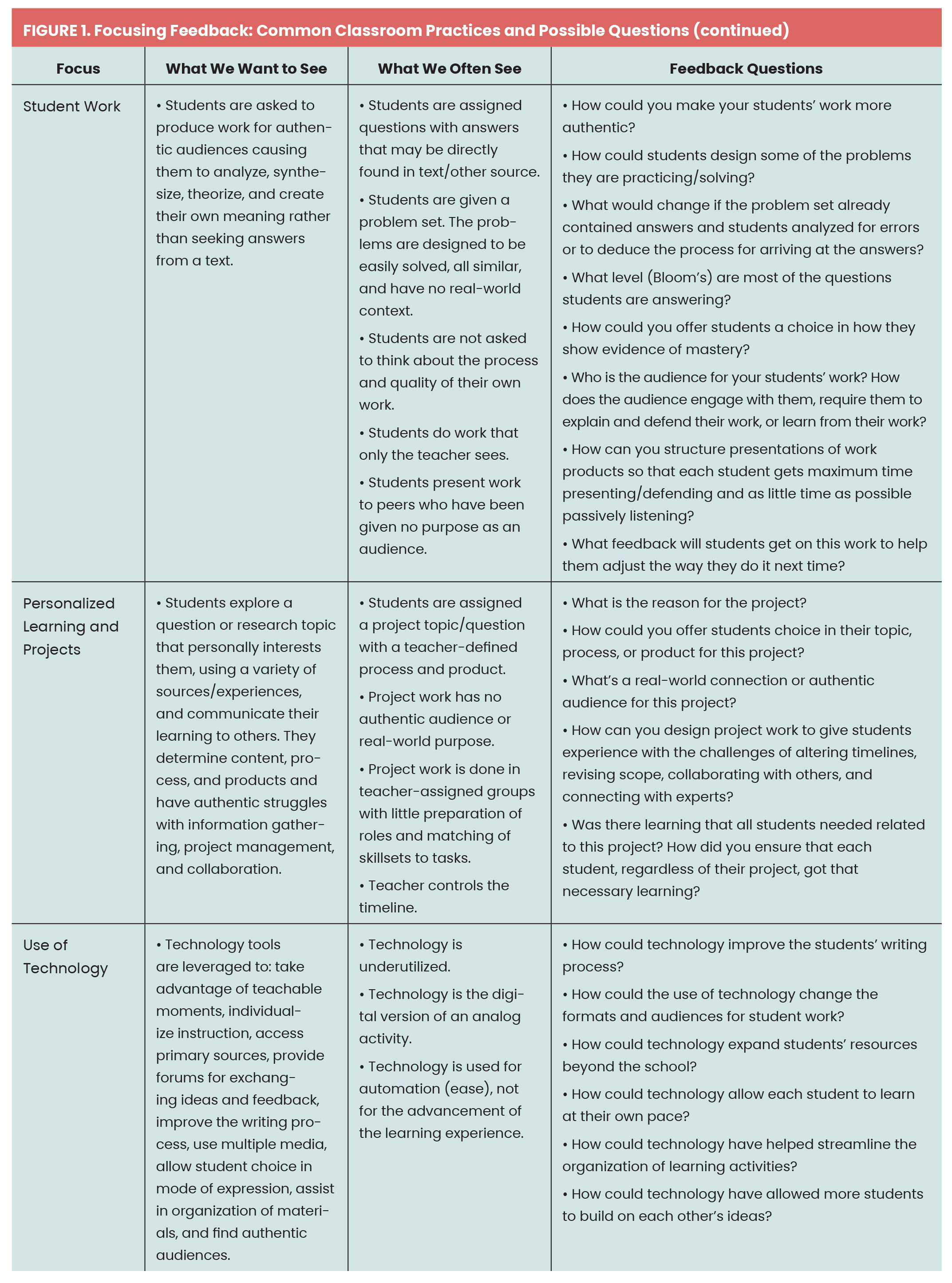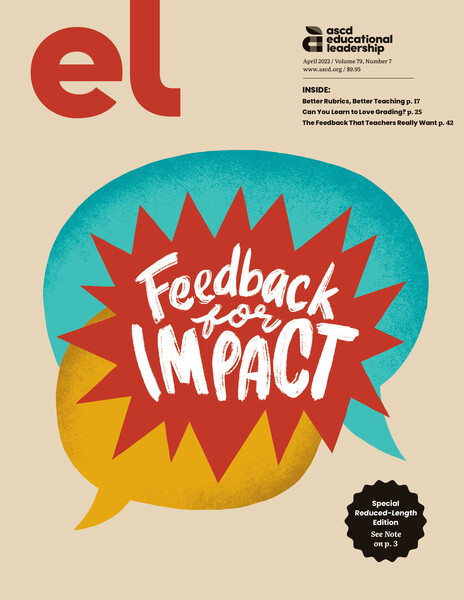Feedback. … We've all experienced the ear-piercing screech when an amateur audio technician creates a loop between microphones. School leaders should note the word's double meaning: although feedback can amplify teachers' best practices, it can also make an audience cringe and stop listening. Specific, actionable feedback to teachers is one of the most valuable commodities in any school environment. It can significantly impact students' learning experiences, if delivered with precision and connection (Cantrell & Kane, 2013).
In 2012, the state of Indiana moved to a teacher evaluation process requiring multiple observations of each teacher annually. As school leaders (Sean, a middle school principal, and Jenny, the district's chief academic officer), we completed hundreds of classroom observations in the years following. The process matched that in many schools: scripting what we observe; providing written, actionable feedback; and holding post-observation discussions with each teacher. Our leadership team, made up of school and district administrators, discussed early on how the feedback and dialogue generated by these observations could have an impact on teaching and learning commensurate with the extraordinary commitment of time and training to do them. These conversations changed our culture significantly, prompting our leaders to hone their observation and feedback skills in order to elicit an outcome worthy of the effort.
The learning curve, however, was steep. Many administrators felt comfortable giving suggestions to new or struggling teachers, but less confident about engaging master practitioners in critical analysis of their work. Few administrators have experience as instructional coaches, and it takes time and skill to create a "community of professional inquiry" including self-assessment, reflection, and professional conversation (Danielson, 2016).
We trained constantly to become better observers and studied how to generate feedback that mattered to teachers, eventually transitioning to a system that included teachers themselves observing and offering feedback to each other. Here is what we learned about creating a culture of feedback that moves the needle on performance—feedback for impact.
Less "Cringeworthy" Feedback
All teachers know the educator's classic nightmare—the one where they are teaching a lesson, without materials and completely unprepared, in a class of unruly students. Amid the chaos, the panicked teacher sees the principal silently observing from the back of the classroom and feels the dread only a performance evaluation can bring. Given this limbic (albeit semi-conscious) response, how can feedback have any constructive impact? Some of our leadership team's liveliest conversations over the last decade have centered on how to make observational feedback not only actionable but desirable.
Observations are not check-ups to catch mistakes; they are the way we dignify the work and the professional doing it.
For teachers, receiving feedback on their work can feel threatening, even though they give it to students regularly. The simple addition of an observer in a classroom scripting or capturing video can feel unsettling. One teacher shared an article with her principal that described the dread she felt during an observation: "Having someone watch you teach is almost like a stranger standing in your dressing room watching you dress—it feels like an invasion of privacy" (Richardson, 2000).
Many teachers feel anxious when given suggestions for improvement, as if it connotes failure. Some find feedback insulting: How can anyone who hasn't taught their discipline or grade level offer advice about improving performance? Veteran teachers may even resist the idea that they need feedback at all; they have mastered their craft through decades of experience.
Overcoming the "cringe and cover your ears" reaction to feedback requires shifting teachers' mindsets so that being observed brings a sense of pride, not panic. In our district, we chose to do this by framing the observation and analysis of classroom work as the highest honor we can pay professionals. As we moved to new observation practices, we constantly reminded our staff that teachers are highly skilled practitioners in a demanding field with an intricate practice to discuss. Observations are not check-ups to catch mistakes; they are the way we dignify the work and the professional doing it. Feedback is the ultimate compliment of the high-wire act teachers perform courageously every day.
Observers must also shift mindsets, we concluded, from thinking like supervisors to thinking like colleagues—people who have also taught, struggled with a challenging student, altered an activity mid-flight, or lived through a lesson that didn't work as planned. To do this, evaluators must take off their leadership hat and put on one of a critical friend and experienced teammate—one with the courage to ask hard questions about instructional practice.
Too often, school leaders enter a classroom taking the position of expert who will identify how to fix things, rather than curious witness to your work. But curiosity is key, we learned. Honoring teachers' professional expertise requires that we ask questions, listen and prompt as they analyze the performance we captured for them, and provide ideas and resources as they identify what they need to keep growing.
With these new mindsets, our schools become true professional learning communities, teaching ecosystems where the work is important and fascinating enough to examine and keep improving, together.
Letting Questions Do the Talking
Observers often frame feedback as a list of "corrections" sandwiched between two positive comments. But coaching experts can affirm this "comment sandwich" does little to transform practice. The research is clear on the importance of agency for learners—especially adult learners (Knight, 2018). Being told what to do does not transform performance, and many schools may not have the luxury of an instructional coach to support teachers. Thus, school leaders must learn to deliver feedback that eliminates telling and directing; instead, they must offer evidence (a script or video of performance) and thoughtful questions—prompting teachers to construct their own understanding of strengths, needs, and next steps.
Our conversations with teachers have shown that feedback is best received and acted on when it is focused on a small number of high-leverage classroom practices and framed in the form of questions that prompt discussion about how to improve them. Questioning common classroom structures that educators often take for granted elicits deeper thinking about why we employ them and whether they work. We've found that questions often lead to ideas for change and requests for support, or advice from the experienced observer—who has the advantage of seeing many teachers in action—usually initiated by the teacher getting the feedback.
An examination of performance with a curious colleague asking questions can eliminate the typical "fight or flight" response to observations and develop a teacher's ability to self-assess and strategize ways to improve instruction. When the two of us shifted to a questions-first approach with the 75 teachers we had been working with and observing, our teachers were better able to identify specific actions that might improve their next performance.
Figure 1 (Download PDF) offers a wealth of examples of desired outcomes we sought, common practices we observed, and the types of questions we used to prompt teachers to examine the difference. An Empowering Process
Feedback can sound like criticism or collegial curiosity. It can cause a listener to recoil or lean forward into a lively conversation about improving teaching and learning. Offered in the form of gathered evidence and purposeful questions, feedback empowers and honors educators, builds trust, prompts reflection, and develops the skills to analyze performance for continuous professional growth.
Over the last eight years, our observations of teachers who have engaged in this process of analyzing and questioning practice have revealed substantive changes in the teachers' instructional choices and improvement in their implementation of instructional strategies. As a result, we are seeing much more engaged and productive learners.
Reflect & Discuss
➛ How are observations framed in your school or district? Could you recast the analysis of classroom practice as "the highest honor we can pay professionals"?
➛ In your experience, what makes classroom observations most helpful?
➛ Do you think a shift from delivering post-observational feedback to asking thoughtful questions could put teachers at ease—and make them more receptive to instructional change?










